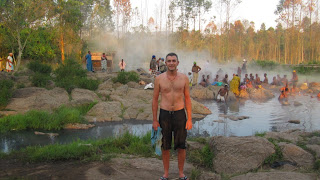

And.. there's a feature running in this Saturday's Herald Magazine (05/11) about our trip.





 assuage a momentary feeling of guilt by that handing out pens, sweets and money to poor children along the roadside in Uganda, Rwanda and other developing countries.. Thanks. The fact that this means children stop going to school in case they're lucky enough to get some money or a Bic biro.. and that more of them get run over.. and that it creates a culture of begging from a young age seems to pass most people by. Once you're on a bike and you're rolling through towns and villages and countryside slowly you get a real appreciation for how many children now think muzungus are bank machines.
assuage a momentary feeling of guilt by that handing out pens, sweets and money to poor children along the roadside in Uganda, Rwanda and other developing countries.. Thanks. The fact that this means children stop going to school in case they're lucky enough to get some money or a Bic biro.. and that more of them get run over.. and that it creates a culture of begging from a young age seems to pass most people by. Once you're on a bike and you're rolling through towns and villages and countryside slowly you get a real appreciation for how many children now think muzungus are bank machines.
 the road. A red or yellow road on the map could in fact be an almost vertical marram track, strewn with boulders, giant holes, crooked ravines, sand, road works and mud. The further south we went in Uganda the more exciting and unpredictable the roads became and the more spectacular the views. There were clues - such as the word volcano or crater lake in the map - but no contours. It's exciting too that road works continue despite the traffic. The idea of closing a road to allow safe passage while gritters, rollers, water sprinklers and giant diggers cut up and re-form the road, is anathema.
the road. A red or yellow road on the map could in fact be an almost vertical marram track, strewn with boulders, giant holes, crooked ravines, sand, road works and mud. The further south we went in Uganda the more exciting and unpredictable the roads became and the more spectacular the views. There were clues - such as the word volcano or crater lake in the map - but no contours. It's exciting too that road works continue despite the traffic. The idea of closing a road to allow safe passage while gritters, rollers, water sprinklers and giant diggers cut up and re-form the road, is anathema. 













 incredibly relaxing and jovial. When they're not taking wrong turns into matatu (aka tro tro bus) parks, they're taking on the sizeable task of advising the Education Inspectorate on modern procedures and targets. See http://www.ritchiesinuganda.blogspot.com/
incredibly relaxing and jovial. When they're not taking wrong turns into matatu (aka tro tro bus) parks, they're taking on the sizeable task of advising the Education Inspectorate on modern procedures and targets. See http://www.ritchiesinuganda.blogspot.com/ 





 cars all congregate in the evening to clean out their filth into the lake alongside boat operators trying to attract tourists for hippo trips. This takes place opposite a huge factory which we're told just dumps its waste into the lake. Pretty sad for those trying to eke a living from the tourists here.
cars all congregate in the evening to clean out their filth into the lake alongside boat operators trying to attract tourists for hippo trips. This takes place opposite a huge factory which we're told just dumps its waste into the lake. Pretty sad for those trying to eke a living from the tourists here.








 1992 Olympic steeplechase champion Matthew Birir (as you do) http://en.wikipedia.org/wiki/Matthew_Birir.
1992 Olympic steeplechase champion Matthew Birir (as you do) http://en.wikipedia.org/wiki/Matthew_Birir.


 mine - that this is in fact a mini rift valley running off the Great one formed billions of years ago. We go on a stunning adventure to see colobus monkeys with Alistair and Laura and then test claustrophobia to the max with a trip down the gold mine. It's fascinating, painstaking work that bears no relation to the panning of the Wild West. Concise geological mapping of a reef or seam of quartz (formed billions of years ago when liquid rushed in to fill gaps left by the shifting plates). Precise explosions. Grinding and then chemical treatment. Interesting to see where things actually come from. I didn't even freak out.
mine - that this is in fact a mini rift valley running off the Great one formed billions of years ago. We go on a stunning adventure to see colobus monkeys with Alistair and Laura and then test claustrophobia to the max with a trip down the gold mine. It's fascinating, painstaking work that bears no relation to the panning of the Wild West. Concise geological mapping of a reef or seam of quartz (formed billions of years ago when liquid rushed in to fill gaps left by the shifting plates). Precise explosions. Grinding and then chemical treatment. Interesting to see where things actually come from. I didn't even freak out.